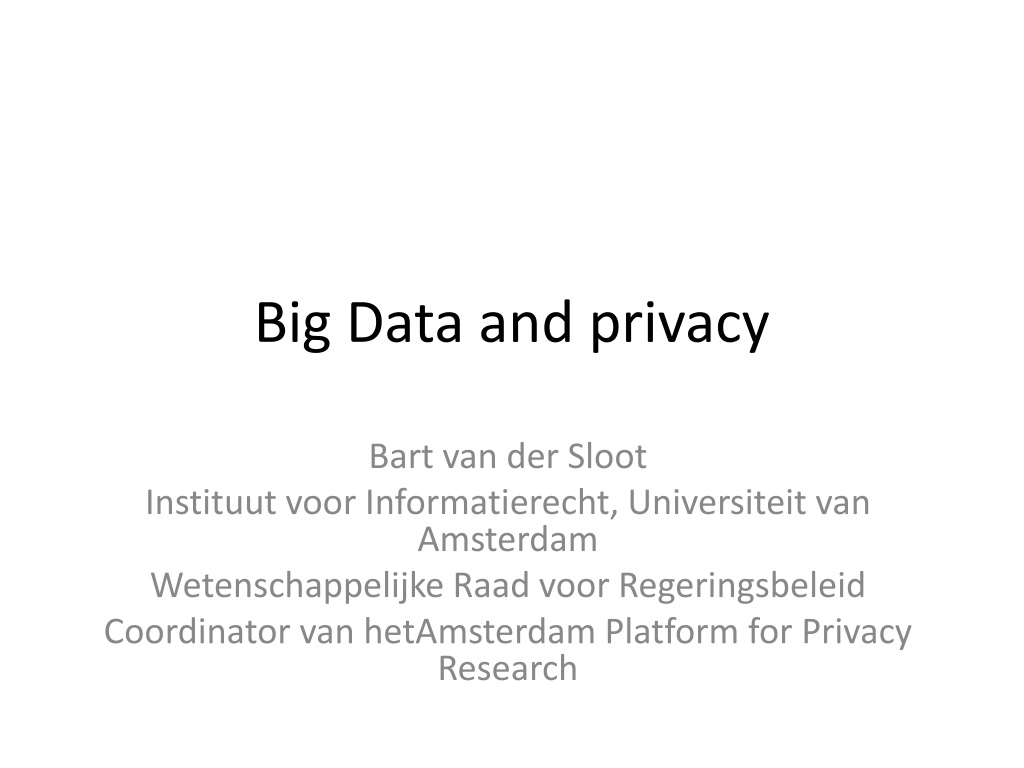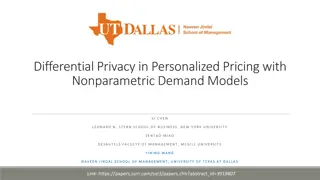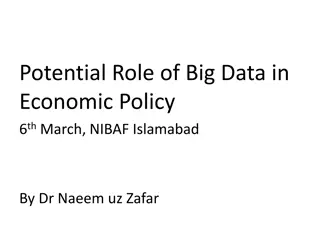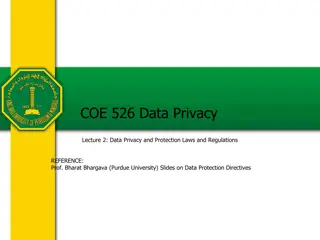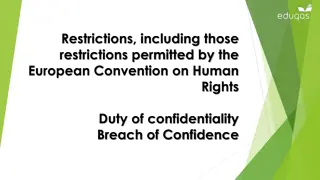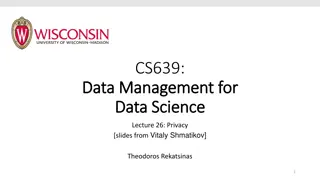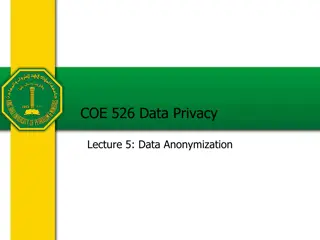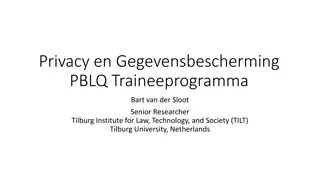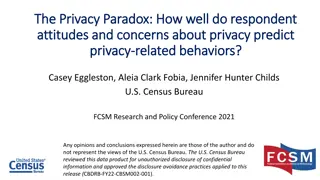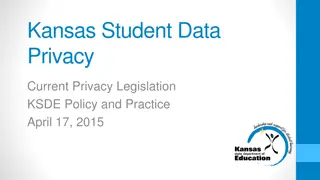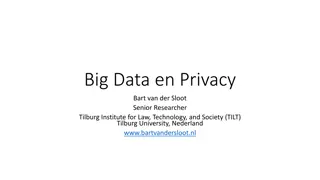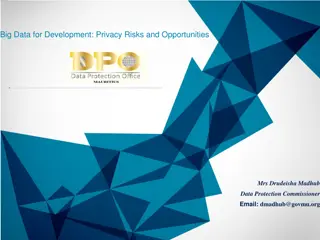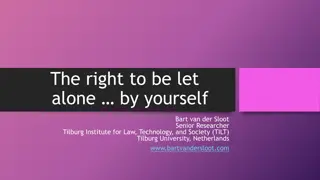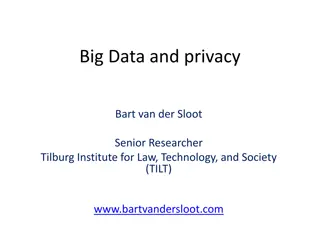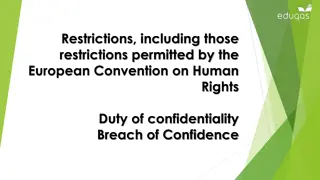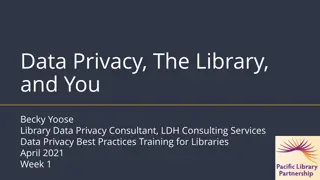Understanding Big Data and Privacy Issues in Today's Society
Explore the intersection of big data and privacy through the insights of Bart van der Sloot. Delve into current privacy issues, the application of big data, legal frameworks, recent developments, and the challenges between big data and privacy protection. Gain knowledge from interactive debates, studies on big data utilization by various sectors, and industry reports highlighting key aspects of big data such as volume, velocity, and variety.
Download Presentation

Please find below an Image/Link to download the presentation.
The content on the website is provided AS IS for your information and personal use only. It may not be sold, licensed, or shared on other websites without obtaining consent from the author. Download presentation by click this link. If you encounter any issues during the download, it is possible that the publisher has removed the file from their server.
E N D
Presentation Transcript
Big Data and privacy Bart van der Sloot Instituut voor Informatierecht, Universiteit van Amsterdam Wetenschappelijke Raad voor Regeringsbeleid Coordinator van hetAmsterdam Platform for Privacy Research
Overzicht 14.00-14.20 Algemene introductie en korte discussie met publiek over een aantal actuele privacy issues 14.20-14.40 Bespreking van het fenomeen Big Data en de concrete toepassing daarvan in de praktijk 14.40-15.00 Bespreking van het huidige juridische kader (Richtlijn bescherming persoonsgegevens, EVRM, etc.) 15.00-15.20 Bespreking van aantal actuele ontwikkelingen (Algemene Verordening, Privacy Shield, Zakharov) 15.20-15.40 Bespreking van uitdagingen en spanningsvelden tussen Big Data en privacy/gegevensbescherming
(2) Big Data WRR Advies Boek 4 working papers
(2) Big Data Verzoek van de Regering (1) Verschil verzamelen en gebruik gegevens (2) Gebruik van profiling en algoritmes (3) Gebruik van quantum computing: encryptie/decryptie (4) Rechten van burgers
(2) Big Data Internet publicaties Sascha van Schendel: Analyse van het gebruik van Big Data door de MIVD en AIVD 2015 Rosamunde van Brakel: Case Study gebruik Big Data door de politie in Nederland Peter Olsthorn: Big Data bij de belastingdienst Leo Ottes: Big Data in de zorg Bart van der Sloot & Sascha van Schendel: International and comparative legal study on Big Data
(2) Big Data The Gartner Report focusses on three matters when describing Big Data: increasing volume (amount of data), velocity (speed of data processing), and variety (range of data types and sources). This is also called the 3v model or 3v theory Authors have added new V s such as Value (Dijcks, 2012; Dumbill, 2013), Variability (Hopkins & Evelson, 2011; Tech America Foundation, 2012), Veracity (IBM, 2015) and Virtual (Zikopoulos et al 11; Akerkar et al 2015).
(2) Big Data The Article 29 Working Party: Big Data is a term which refers to the enormous increase in access to and automated use of information. It refers to the gigantic amounts of digital data controlled by companies, authorities and other large organizations which are subjected to extensive analysis based on the use of algorithms. Big Data may be used to identify general trends and correlations, but it can also be used such that it affects individuals directly. The European Data Protection Supervisor: Big data means large amounts of different types of data produced at high speed from multiple sources, whose handling and analysis require new and more powerful processors and algorithms. Not all of these data are personal, but many players in the digital economy increasingly rely on the large scale collection of and trade in personal information. As well as benefits, these growing markets pose specific risks to individual's rights to privacy and to data protection.
(2) Big Data The Estonian DPA describes Big Data as collected and processed open datasets, which are defined by quantity, plurality of data formats and data origination and processing speed. The Luxembourg DPA: Big Data stems from the collection of large structured or unstructured datasets, the possible merger of such datasets as well as the analysis of these data through computer algorithms. It usually refers to datasets which cannot be stored, managed and analysed with average technical means due to their size. Personal data can also be a part of Big Data but Big Data usually extends beyond that, containing aggregated and anonymous data. The Dutch DPA: Big Data is all about collecting as much information as possible ; storing it in ever larger databases ; combining data that is collected for different purposes ; and applying algorithms to find correlations and unexpected new information. The Slovenian DPA: Big Data is a broad term for processing of large amounts of different types of data, including personal data, acquired from multiple sources in various formats. Big Data revolves around predictive analytics acquiring new knowledge from large data sets which requires new and more powerful processing applications. The UK DPA: repurposing data; using algorithms to find correlations in datasets rather than constructing traditional queries; and bringing together data from a variety of sources, including structured and unstructured data. The Swedish DPA argues that the concept is used for situations where large amounts of data are gathered in order to be made available for different purposes, not always precisely determined in advance.
(2) Big Data Umbrella term Open Data: Lots of Big Data initiatives are linked to Open Data. Open Data is the idea, as the name suggests, that (government) data should be public. Traditionally, it is linked to the strive for transparency in the public sector and for more control over government power by media and/or citizens. In particular, the Estonian DPA is very explicit about the relationship between Open Data and Big Data. Big Data is defined as collected and processed open datasets, which are defined by quantity, plurality of data formats and data origination and processing speed . The desk research also shows a clear link between the two concepts in some countries, such as Australia, France, Japan and the United Kingdom.
(2) Big Data Re-Use: Linked to Open Data is the idea of re-use of data. Yet there is one important difference. While Open Data traditionally concerned the transparency of and control on government power, there re-use of (government) data is specifically intended to promote the commercial exploitation of these data by businesses and private parties. The re-use of Public Sector Information is stimulated through the PSI Directive of the European Union. But more in general, re-use refers to the idea that data can be used for another purpose than for which they were originally collected. The Norwegian DPA, inter alia, has suggested the relationship between Big Data and the re-use of data. The Norwegians use the definition of the Working Group 29, but also add what in our opinion is the key aspect of Big Data, namely that it is about the compilation of data from several different sources. In other words, it is not just the volume in itself that is of interest, but the fact that secondary value is derived from the data through reuse and analysis. The desk research also showed a link between the two concepts. In France, for example, Big Data is primarily seen as a phenomenon based on the re- use of data for new purposes and on the combination of different data and datasets. Directive 2003/98/EC of the European Parliament and of the Council of 17 November 2003 on the re-use of public sector information. Directive 2013/37/EU of the European Parliament and the Council of 26 June 2013 amending Directive 2003/98/EC on the re-use of public sector information.
(2) Big Data Internet of things: The term the Internet of Things refers to the idea that more and more things are connected to the Internet. This may include cars, lampposts, refrigerators, pants, or whatever object. This allows for the development of smart devices - for example, a refrigerator that records that the milk is out and automatically orders new. By providing all objects with a sensor, large quantities of data can be collected. Therefore, Big Data and the Internet of Things are often mentioned in the same breath. An example would be the DPA of the United Kingdom noting that big data may involve not only data that has been consciously provided by data subjects, but also personal data that has been observed (e.g. from Internet of Things devices), derived from other data or inferred through analytics and profiling.
(2) Big Data Smart: Because of the applications of the internet of things and the constantly communicating devices and computers, the development of smart products and services has spiralled. Examples of such developments are smart cities, smart devices and smart robots. The desk research indicates that in a number of countries, a link is made between such developments and Big Data systems, for example the United States and the United Kingdom. Also, the DPA from Luxembourg emphasizes the relationship with smart systems, such as smart metering. At a national level, a system of smart metering for electricity and gas has been launched. The project is however still in a testing phase. - The CNPD has not issued any decisions, reports or opinions that are directly dealing with Big Data. The Commission has however issued an opinion in a related matter, namely with regard to the problematic raised by smart metering. In 2013, the CNPD issued an opinion on smart metering. The main argument of the opinion highlights the necessity to clearly define the purposes of the data processing as well as the retention periods of the data related to smart metering.
(2) Big Data Profiling: A term that is often associated with Big Data and is sometimes included as part of the definition of Big Data is profiling. Because increasingly large data sets are collected and analysed, the conclusions and correlations are mostly formulated on a general or group level. This mainly involves statistical correlations, sometimes of a predictive nature. Germany is developing new laws on profiling and a number of DPAs emphasize the relationship of Big Data with profiling, such as the DPA of Netherlands, Slovenia, the UK and Belgium. The latter argues: The general data protection law applies, and we expect that de new data protection regulation will be able to provide a partial answer (profiling) to big data issues (legal interpretation of the EU legal framework).
(2) Big Data Algoritmes: A term that recurs in very many definitions of Big Data is algorithms. This applies to the definition of Working Party 29, the EDPS and a number of DPAs such as that of Luxembourg, the Netherlands and the UK. A number of countries also have a special focus on algorithms. In Australia, a Program Protocol applies to certain cases a report may be issues in which the following elements are contained: a description of the data, a specification of each matchings algorithm, the expected risks and how they will be addressed, the means for checking the integrity and the security measures used.
(2) Big Data Cloud Computing: Cloud computing is also often associated with Big Data processes. In particular, in China and Israel, the two terms are often connected to each other. For example, the Chinese vice- premier stressed that the government wants to make better use of technologies like Big Data and cloud computing to support innovation; according to the prime minister mobile Internet, cloud computing, Big Data and the Internet of Things are integrated with production processes, and will thus be an important engine for economic growth. In Israel, the plan is for the army to have a cloud where all data are stored in 2015 - there is even talk of a "combat computing cloud", a data center that will make available different tools to forces on the ground. Also, some DPAs suggest a relationship between cloud computing and Big Data; the Slovenian DPA states, for example, that new concepts and paradigms, such as cloud computing or big data should not lower or undermine the current levels of data protection as a fundamental human right.
(2) Big Data In the United States, more than $ 200 million was reserved for a research and development initiative for Big Data, to be spent by six federal government departments;the army invested the most in Big Data projects, namely $ 250 million;$ 160 million was invested in a smart cities initiative, investing in 25 collaborations focused on data usage. In the United Kingdom, 159 million was spent on high-quality computer and network infrastructure,there are 189 million in investments to support Big Data and to develop the data infrastructure of the UK and 10.7 million will be spent on a center for Big Data and space technologies.In addition, 42 million will be spent on the Alan Turing Institute for analysis and application of big data, 50 million for 'The Digital Catapult', where researchers and industry are brought together to come up with innovative products and lastly, the Minister of Universities and Science in February 2014 announced a new investment of 73 million in Big Data. This is used for bioinformatics, open data projects, research and the use of environmental data. In South-Africa, the government has invested 2 billion South-African Rand, approximately 126.8 million, in the Square Kilometre Array (SKA) project. A project which revolves around very large data sets. In France, seven research projects related to Big Data were given 11.5 million. In Germany, the Ministry of Education and Research invested 10 million in Big Data research institutes and 20 million in Big Data research; this ministry will also invest approximately 6.4 million in the project Abida, a four-year interdisciplinary research project on the social and economic effects of large data sets.
(2) Big Data Waar wordt Big Data toegepast? Internet bedrijven: advertenties Medische sector: whole genome analysis Belastingdienst: risicoprofielen Politie: predictive policing Inlichtingendiensten: terreurbestrijding
(2) Big Data Primarily in the private sector, to a lesser extent in the public sector, especially security related The Hungarian DPA, for example, emphasizes that in Hungarian business sphere more and more enterprises such as banks, supermarkets, media and telecommunication companies use and take advantage of the possibilities in Big Data. The DPA from Luxembourg holds: To our knowledge there are no prominent examples of the use of Big Data in the law enforcement sector or by police or intelligence services in Luxembourg. There are however other actors which deal with Big Data. The Norwegian DPA argues along the same line: There are, as far as we know, no usage of big data within the law enforcement sector in Norway. In 2014, the intelligence service addressed in a public speech the need to use big data techniques in order to combat terrorism more efficiently. However, politicians across all parties reacted very negatively to this request and no formal request to use such techniques has since been launched by the intelligence service. The companies that are most advanced when it comes to using big data may be found within the telecom (eg. Telenor) and media (eg. Schibsted and Cxence) sector. The tax and customs authorities have also initiated projects in which they look at how big data can be used to enhance the efficiency of their work. The Norwegian DPA continues: At the Norwegian DPA we are currently looking into how it affects our privacy when personal data is more and more turning into an valuable commodity in all sectors of the economy. We are writing a report on how big data is used within the advertising industry, and how the use of automated, personalised marketing triggers an enourmous appetite for and exchange of personal data.
(2) Big Data The Slovenian DPA emphasizes: We have thus far not seen prominent examples of the use of Big Data in our country. To our knowledge Big Data applications are particularly of interest in insurance, banking and electronic communications sector, mostly to battle fraud and other illegal practices. Another important field is scientific and statistical research. Law enforcement use is to our knowledge currently at development stages (e.g. in the case of processing Passenger Name Records), whereas information about the use of Big Data at intelligence services is either not available or of confidential nature. The Swedish DPA holds: We have not carried out any specific supervision related to the concept Big Data and do not have any statistics or specific information on how this is used. In our opinion, the law enforcement sector does not use Big Data. Their personal data processing is strictly regulated in terms of collection of data, limited purposes etc. Finally, the DPA from the United Kingdom states: We have not carried out a comprehensive market assessment of big data but, from our contacts with business and our desk research, our impression is that the take up of big data is still at a relatively early stage in the UK. Nevertheless, we know that companies are actively investigating the potential of big data, and there are some examples of big data in practice, such as the use of telematics in motor insurance, the use of mobile phone location data for market research, and the availability of data from the Twitter firehose for analytics. We do not have any specific information on the use of big data in law enforcement or security. The UK Data Protection Act includes a wide-ranging exemption from the data protection principles where it is required for safeguarding national security.
(3) Juridisch Kader Europees Verdrag voor de Rechten van de Mens = Raad van Europa Handvest voor de grondrechten van de Europese Unie = Europese Unie Richtlijn bescherming persoonsgegevens = Europese Unie Wet bescherming persoonsgegevens = NL Diverse sector-specifieke wetgeving
(3) Juridisch Kader EVRM ARTIKEL 8 Recht op eerbiediging van priv -, familie- en gezinsleven 1. Een ieder heeft recht op respect voor zijn priv leven, zijn familie- en gezinsleven, zijn woning en zijn correspondentie. 2. Geen inmenging van enig openbaar gezag is toegestaan in de uitoefening van dit recht, dan voor zover bij de wet is voorzien en in een democratische samenleving noodzakelijk is in het belang van de nationale veiligheid, de openbare veiligheid of het economisch welzijn van het land, het voorkomen van wanordelijkheden en strafbare feiten, de bescherming van de gezondheid of de goede zeden of voor de bescherming van de rechten en vrijheden van anderen.
(3) Juridisch Kader EVRM, vier belangrijke ontwikkelingen (1) Alleen subjectieve rechten ARTIKEL 33 Interstatelijke zaken Elke Hoge Verdragsluitende Partij kan elke vermeende niet nakoming van de bepalingen van het Verdrag en de Protocollen daarbij door een andere Hoge Verdragsluitende Partij bij het Hof aanhangig maken. ARTIKEL 34 Individuele verzoekschriften Het Hof kan verzoekschriften ontvangen van ieder natuurlijk persoon, iedere niet-gouvernementele organisatie of iedere groep personen die beweert slachtoffer te zijn van een schending door een van de Hoge Verdragsluitende Partijen van de rechten die in het Verdrag of de Protocollen daarbij zijn vervat. De Hoge Verdragsluitende Partijen verplichten zich ertoe de doeltreffende uitoefening van dit recht op generlei wijze te belemmeren
(3) Juridisch Kader EVRM, vier belangrijke ontwikkelingen (2) Alleen individuele belangen X/ICELAND: The right to respect for private life does not end there. It comprises also, to a certain degree, the right to establish and to develop relationships with other human beings, especially in the emotional field for the development and fulfillment of one's own personality.
(3) Juridisch Kader EVRM, vier belangrijke ontwikkelingen (3) Focus op belangenafweging Individuele belang dat met privacy is gemoeid Afgewogen tegen algemene belang dat met de privacyschending is gemoeid, bijvoorbeeld nationale veiligheid
(3) Juridisch Kader EVRM, vier belangrijke ontwikkelingen (4) Focus op juridische oplossingen Minder schikkingen Meer zaken geaccepteerd onder het EVRM
(3) Juridisch Kader Handvest van de grondrechten van de Europese Unie Artikel 7 Eerbiediging van het priv -leven en het familie- en gezinsleven Eenieder heeft recht op eerbiediging van zijn priv -leven, zijn familie- en gezinsleven, zijn woning en zijn communicatie. Artikel 8 Bescherming van persoonsgegevens 1. Eenieder heeft recht op bescherming van de hem betreffende persoonsgegevens. 2. Deze gegevens moeten eerlijk worden verwerkt, voor bepaalde doeleinden en met toestemming van de betrokkene of op basis van een andere gerechtvaardigde grondslag waarin de wet voorziet. Eenieder heeft recht op toegang tot de over hem verzamelde gegevens en op rectificatie daarvan. 3. Een onafhankelijke autoriteit ziet toe op de naleving van deze regels.
(3) Juridisch Kader Richtlijn bescherming persoonsgegevens "persoonsgegevens", iedere informatie betreffende een ge dentificeerde of identificeerbare natuurlijke persoon, hierna "betrokkene" te noemen; als identificeerbaar wordt beschouwd een persoon die direct of indirect kan worden ge dentificeerd, met name aan de hand van een identificatienummer of van een of meer specifieke elementen die kenmerkend zijn voor zijn of haar fysieke, fysiologische, psychische, economische, culturele of sociale identiteit;
(3) Juridisch Kader (1) Vereiste van een helder en concreet doel Artikel 6 (b) Rbp - voor welbepaalde, uitdrukkelijk omschreven en gerechtvaardigde doeleinden moeten worden verkregen
(3) Juridisch Kader (2) Vereiste van een legitiem doel Artikel 7 De Lid-Staten bepalen dat de verwerking van persoonsgegevens slechts mag geschieden indien: a) de betrokkene daarvoor zijn ondubbelzinnige toestemming heeft verleend, of b) de verwerking noodzakelijk is voor de uitvoering van een overeenkomst waarbij de betrokkene partij is of voor het nemen van precontractuele maatregelen naar aanleiding van een verzoek van de betrokkene, of c) de verwerking noodzakelijk is om een wettelijke verplichting na te komen waaraan de voor de verwerking verantwoordelijke onderworpen is, of d) de verwerking noodzakelijk is ter vrijwaring van een vitaal belang van de betrokkene, of e) de verwerking noodzakelijk is voor de vervulling van een taak van algemeen belang of die deel uitmaakt van de uitoefening van het openbaar gezag die aan de voor de verwerking verantwoordelijke of de derde aan wie de gegevens worden verstrekt, drager is opgedragen, of f) de verwerking noodzakelijk is voor de behartiging van het gerechtvaardigde belang van de voor de verwerking verantwoordelijke of van de derde(n) aan wie de gegevens worden verstrekt, mits het belang of de fundamentele rechten en vrijheden van de betrokkene die aanspraak maakt op bescherming uit hoofde van artikel 1, lid 1, van deze richtlijn, niet prevaleren.
(3) Juridisch Kader (3) Vereiste van doelbinding Artikel 6 (b) - en vervolgens niet worden verwerkt op een wijze de onverenigbaar is met die doeleinden.
(3) Juridisch Kader (4) Vereiste van dataminimalisatie Rbp 6 (c) toereikend, ter zake dienend en niet bovenmatig moeten zijn, uitgaande van de doeleinden waarvoor zij worden verzameld of waarvoor zij vervolgens worden verwerkt; Rbp (e) in een vorm die het mogelijk maakt de betrokkenen te identificeren, niet langer mogen worden bewaard dan voor de verwezenlijking van de doeleinden waarvoor zij worden verzameld of vervolgens worden verwerkt, noodzakelijk is.
(3) Juridisch Kader (5) Vereiste van kwaliteit van data Rbp 6 (d) nauwkeurig dienen te zijn en, zo nodig, dienen te worden bijgewerkt; alle redelijke maatregelen dienen te worden getroffen om de gegevens die, uitgaande van de doeleinden waarvoor zij worden verzameld of waarvoor zij vervolgens worden verwerkt, onnauwkeurig of onvolledig zijn, uit te wissen of te corrigeren;
(3) Juridisch Kader (6) Vereiste van vertrouwelijkheid en veiligheid Artikel 16 Vertrouwelijkheid van de verwerking Een ieder die handelt onder het gezag van de voor de verwerking verantwoordelijke of van de verwerker alsmede de verwerker zelf, die toegang heeft tot persoonsgegevens, mag deze slechts in opdracht van de voor de verwerking verantwoordelijke verwerken, behoudens op grond van wettelijke verplichtingen. Artikel 17 Beveiliging van de verwerking 1. De Lid-Staten bepalen dat de voor de verwerking verantwoordelijke passende technische en organisatorische maatregelen ten uitvoer dient te leggen om persoonsgegevens te beveiligen tegen vernietiging, hetzij per ongeluk, hetzij onrechtmatig, tegen verlies, vervalsing, niet-toegelaten verspreiding of toegang, met name wanneer de verwerking doorzending van gegevens in een netwerk omvat, dan wel tegen enige andere vorm van onwettige verwerking. Deze maatregelen moeten, rekening houdend met de stand van de techniek en de kosten van de tenuitvoerlegging, een passend beveiligingsniveau garanderen gelet op de risico's die de verwerking en de aard van te beschermen gegevens met zich brengen.
(3) Juridisch Kader Weinig regels aangaande het gebruik Artikel 15 Geautomatiseerde individuele besluiten 1. De Lid-Staten kennen een ieder het recht toe niet te worden onderworpen aan een besluit waaraan voor hem rechtsgevolgen zijn verbonden of dat hem in aanmerkelijke mate treft en dat louter wordt genomen op grond van een geautomatiseerde gegevensverwerking die bestemd is om bepaalde aspecten van zijn persoonlijkheid, zoals beroepsprestatie, kredietwaardigheid, betrouwbaarheid, gedrag, enz. te evalueren. 2. Onverminderd het bepaalde in de overige artikelen van deze richtlijn bepalen de Lid-Staten dat een persoon aan een besluit als bedoeld in lid 1 kan worden onderworpen, indien dat besluit: a) wordt genomen in het kader van het sluiten of uitvoeren van een overeenkomst, mits aan het verzoek van de betrokkene is voldaan of passende maatregelen, zoals de mogelijkheid zijn standpunt te doen gelden, zijn genomen ter bescherming van zijn gerechtvaardigde belang; of b) zijn grondslag vindt in een wet waarin de maatregelen zijn omschreven die strekken tot bescherming van het gerechtvaardigde belang van de betrokkene.
(3) Juridisch Kader Artikel 8: Verwerkingen die bijzondere categorie n gegevens betreffen 1. De Lid-Staten verbieden de verwerking van persoonlijke gegevens waaruit de raciale of etnische afkomst, de politieke opvattingen, de godsdienstige of levensbeschouwelijke overtuiging, of het lidmaatschap van een vakvereniging blijkt, alsook de verwerking van gegevens die de gezondheid of het seksuele leven betreffen. 2. Lid 1 is niet van toepassing wanneer: a) de betrokkene uitdrukkelijk heeft toegestemd in een dergelijke verwerking, tenzij in de wetgeving van de Lid-Staat is bepaald dat het in lid 1 bedoelde verbod niet door toestemming van de betrokkene ongedaan kan worden gemaakt; of b) de verwerking noodzakelijk is met het oog op de uitvoering van de verplichtingen en de rechten van de voor de verwerking verantwoordelijke inzake arbeidsrecht, voor zover zulks is toegestaan bij de nationale wetgeving en deze adequate garanties biedt; of c) de verwerking noodzakelijk is ter verdediging van de vitale belangen van de betrokkene of van een andere persoon indien deze lichamelijk of juridisch niet in staat is van zijn instemming te getuigen; of d) de verwerking wordt verricht door een stichting, een vereniging, of enige andere instantie zonder winstoogmerk die op politiek, levensbeschouwelijk, godsdienstig of vakbondsgebied werkzaam is, in het kader van hun gerechtvaardigde activiteiten en met de nodige garanties, mits de verwerking uitsluitend betrekking heeft op de leden van de stichting, de vereniging of de instantie of op de personen die in verband met haar streefdoelen regelmatige contacten met haar onderhouden, en de gegevens niet zonder de toestemming van de betrokkenen aan derden worden doorgegeven; of e) de verwerking betrekking heeft op gegevens die duidelijk door de betrokkene openbaar zijn gemaakt of noodzakelijk is voor de vaststelling, de uitoefening of de verdediging van een recht in rechte.
(4) Actuele juridische ontwikkelingen Regulation Meer Plichten Meer Rechten Meer Handhaving
(4) Actuele juridische ontwikkelingen Regulering, plichten Accountability-verplichting Documentatie Omdraaiing bewijslast Verdere maatregelen aangaande privacy by design en privacy by default
(4) Actuele juridische ontwikkelingen Regulering, meer rechten Recht om vergeten te worden (rechtszaak HvJ) Recht op dataportabiliteit Recht om te verzetten tegen profiling
(4) Actuele juridische ontwikkelingen Regulering, meer handhaving Meer samenwerking tussen handhavende organisaties Harmonisering Regels Hoge boetes: Infringements of the following provisions shall, in accordance with paragraph 2, be subject to administrative fines up to 20 000 000 EUR, or in the case of an undertaking, up to 4 % of the total worldwide annual turnover of the preceding financial year, whichever is higher:
(4) Actuele juridische ontwikkelingen Artikel 4 Toepasselijk nationaal recht 1. Elke Lid-Staat past zijn nationale, ter uitvoering van deze richtlijn vastgestelde bepalingen toe op de verwerking van persoonsgegevens indien: a) die wordt verricht in het kader van de activiteiten van een vestiging op het grondgebied van de Lid- Staat van de voor de verwerking verantwoordelijke; wanneer dezelfde verantwoordelijke een vestiging heeft op het grondgebied van verscheidene Lid-Staten, dient hij de nodige maatregelen te treffen om ervoor te zorgen dat elk van die vestigingen voldoet aan de verplichtingen die worden opgelegd door de toepasselijke nationale wetgeving; b) de voor de verwerking verantwoordelijke niet gevestigd is op het grondgebied van de Lid-Staat, maar in een plaats waar de nationale wet uit hoofde van het internationale publiekrecht van toepassing is; c) de voor de verwerking verantwoordelijke persoon niet gevestigd is op het grondgebied van de Gemeenschap en voor de verwerking van persoonsgegevens gebruik maakt van al dan niet geautomatiseerde middelen die zich op het grondgebied van genoemde Lid-Staat bevinden, behalve indien deze middelen op het grondgebied van de Europese Gemeenschap slechts voor doorvoer worden gebruikt. 2. In de in lid 1, onder c), bedoelde omstandigheden moet de voor de verwerking verantwoordelijke een op het grondgebied van de betrokken Lid-Staat gevestigde vertegenwoordiger aanwijzen, onverminderd rechtsvorderingen die tegen de voor de verwerking verantwoordelijke zelf kunnen worden ingesteld. Internationale verkeersstromen
(4) Actuele juridische ontwikkelingen Artikel 25 Beginselen 1. De Lid-Staten bepalen dat persoonsgegevens die aan een verwerking worden onderworpen of die bestemd zijn om na doorgifte te worden verwerkt, slechts naar een derde land mogen worden doorgegeven indien, onverminderd de naleving van de nationale bepalingen die zijn vastgesteld ter uitvoering van de andere bepalingen van deze richtlijn, dat land een passend beschermingsniveau waarborgt. 2. Het passend karakter van het door een derde land geboden beschermingsniveau wordt beoordeeld met inachtneming van alle omstandigheden die op de doorgifte van gegevens of op een categorie gegevensdoorgiften van invloed zijn; in het bijzonder wordt rekening gehouden met de aard van de gegevens, met het doeleinde en met de duur van de voorgenomen verwerking of verwerkingen, het land van herkomst en het land van eindbestemming, de algemene en sectori le rechtsregels die in het betrokken derde land gelden, alsmede de beroepscodes en de veiligheidsmaatregelen die in die landen worden nageleefd. 3. De Lid-Staten en de Commissie brengen elkaar op de hoogte van de gevallen waarin, naar hun oordeel, een derde land geen waarborgen voor een passend beschermingsniveau in de zin van lid 2 biedt. 4. Wanneer de Commissie volgens de procedure van artikel 31, lid 2, constateert dat een derde land geen waarborgen voor een passend beschermingsniveau in de zin van lid 2 biedt, nemen de Lid-Staten de nodige maatregelen om doorgifte van gegevens van dezelfde aard naar het betrokken land te voorkomen. 5. De Commissie opent op het gepaste ogenblik onderhandelingen ter verhelping van de situatie die voortvloeit uit de in lid 4 bedoelde constatering. 6. De Commissie kan volgens de procedure van artikel 31, lid 2, constateren dat een derde land, op grond van zijn nationale wetgeving of zijn internationale verbintenissen, die het met name na de in lid 5 bedoelde onderhandelingen is aangegaan, waarborgen voor een passend beschermingsniveau in de zin van lid 2 biedt met het oog op de bescherming van de persoonlijke levenssfeer en de fundamentele vrijheden en rechten van personen. De Lid-Staten nemen de nodige maatregelen om zich naar het besluit van de Commissie te voegen.
(4) Actuele juridische ontwikkelingen Safe Harbour agreement Schrems Zaak Privacy Shield negotiations
(4) Actuele juridische ontwikkelingen Zakharov: the ECtHR specified that the Court accepts that an applicant can claim to be the victim of a violation occasioned by the mere existence of secret surveillance measures, or legislation permitting secret surveillance measures, if the following conditions are satisfied. Firstly, the Court will take into account the scope of the legislation permitting secret surveillance measures by examining whether the applicant can possibly be affected by it, either because he or she belongs to a group of persons targeted by the contested legislation or because the legislation directly affects all users of communication services by instituting a system where any person can have his or her communications intercepted. Secondly, the Court will take into account the availability of remedies at the national level and will adjust the degree of scrutiny depending on the effectiveness of such remedies. As the Court underlined in Kennedy, where the domestic system does not afford an effective remedy to the person who suspects that he or she was subjected to secret surveillance, widespread suspicion and concern among the general public that secret surveillance powers are being abused cannot be said to be unjustified. In such circumstances the menace of surveillance can be claimed in itself to restrict free communication through the postal and telecommunication services, thereby constituting for all users or potential users a direct interference with the right guaranteed by Article 8. There is therefore a greater need for scrutiny by the Court and an exception to the rule, which denies individuals the right to challenge a law in abstracto, is justified. In such cases the individual does not need to demonstrate the existence of any risk that secret surveillance measures were applied to him. By contrast, if the national system provides for effective remedies, a widespread suspicion of abuse is more difficult to justify. In such cases, the individual may claim to be a victim of a violation occasioned by the mere existence of secret measures or of legislation permitting secret measures only if he is able to show that, due to his personal situation, he is potentially at risk of being subjected to such measures. Zakharov, paragraaf 171.
(5) Big Data en Privacy Onder het EVRM: (1) Individueel recht (2) Individuele belagen (3) Belangenafweging (4) Juridische regeling
